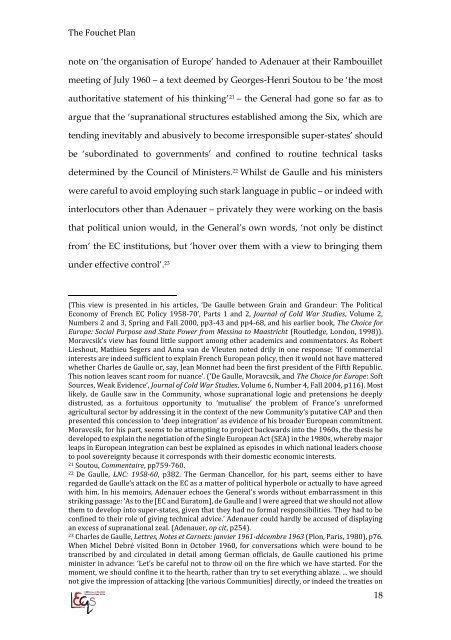The Fouchet Plan De Gaulle’s Intergovernmental Design for Europe
n?u=RePEc:eiq:eileqs:117&r=cdm
n?u=RePEc:eiq:eileqs:117&r=cdm
You also want an ePaper? Increase the reach of your titles
YUMPU automatically turns print PDFs into web optimized ePapers that Google loves.
<strong>The</strong> <strong>Fouchet</strong> <strong>Plan</strong><br />
note on ‘the organisation of <strong>Europe</strong>’ handed to Adenauer at their Rambouillet<br />
meeting of July 1960 – a text deemed by Georges-Henri Soutou to be ‘the most<br />
authoritative statement of his thinking’ 21 – the General had gone so far as to<br />
argue that the ‘supranational structures established among the Six, which are<br />
tending inevitably and abusively to become irresponsible super-states’ should<br />
be ‘subordinated to governments’ and confined to routine technical tasks<br />
determined by the Council of Ministers. 22 Whilst de Gaulle and his ministers<br />
were careful to avoid employing such stark language in public – or indeed with<br />
interlocutors other than Adenauer – privately they were working on the basis<br />
that political union would, in the General’s own words, ‘not only be distinct<br />
from’ the EC institutions, but ‘hover over them with a view to bringing them<br />
under effective control’. 23<br />
(This view is presented in his articles, ‘<strong>De</strong> Gaulle between Grain and Grandeur: <strong>The</strong> Political<br />
Economy of French EC Policy 1958-70’, Parts 1 and 2, Journal of Cold War Studies, Volume 2,<br />
Numbers 2 and 3, Spring and Fall 2000, pp3-43 and pp4-68, and his earlier book, <strong>The</strong> Choice <strong>for</strong><br />
<strong>Europe</strong>: Social Purpose and State Power from Messina to Maastricht (Routledge, London, 1998)).<br />
Moravcsik’s view has found little support among other academics and commentators. As Robert<br />
Lieshout, Mathieu Segers and Anna van de Vleuten noted drily in one response: ‘If commercial<br />
interests are indeed sufficient to explain French <strong>Europe</strong>an policy, then it would not have mattered<br />
whether Charles de Gaulle or, say, Jean Monnet had been the first president of the Fifth Republic.<br />
This notion leaves scant room <strong>for</strong> nuance’. (‘<strong>De</strong> Gaulle, Moravcsik, and <strong>The</strong> Choice <strong>for</strong> <strong>Europe</strong>: Soft<br />
Sources, Weak Evidence’, Journal of Cold War Studies, Volume 6, Number 4, Fall 2004, p116). Most<br />
likely, de Gaulle saw in the Community, whose supranational logic and pretensions he deeply<br />
distrusted, as a <strong>for</strong>tuitous opportunity to ‘mutualise’ the problem of France’s unre<strong>for</strong>med<br />
agricultural sector by addressing it in the context of the new Community’s putative CAP and then<br />
presented this concession to ‘deep integration’ as evidence of his broader <strong>Europe</strong>an commitment.<br />
Moravcsik, <strong>for</strong> his part, seems to be attempting to project backwards into the 1960s, the thesis he<br />
developed to explain the negotiation of the Single <strong>Europe</strong>an Act (SEA) in the 1980s, whereby major<br />
leaps in <strong>Europe</strong>an integration can best be explained as episodes in which national leaders choose<br />
to pool sovereignty because it corresponds with their domestic economic interests.<br />
21 Soutou, Commentaire, pp759-760.<br />
22 <strong>De</strong> Gaulle, LNC: 1958-60, p382. <strong>The</strong> German Chancellor, <strong>for</strong> his part, seems either to have<br />
regarded de <strong>Gaulle’s</strong> attack on the EC as a matter of political hyperbole or actually to have agreed<br />
with him. In his memoirs, Adenauer echoes the General’s words without embarrassment in this<br />
striking passage: ‘As to the [EC and Euratom], de Gaulle and I were agreed that we should not allow<br />
them to develop into super-states, given that they had no <strong>for</strong>mal responsibilities. <strong>The</strong>y had to be<br />
confined to their role of giving technical advice.’ Adenauer could hardly be accused of displaying<br />
an excess of supranational zeal. (Adenauer, op cit, p254).<br />
23 Charles de Gaulle, Lettres, Notes et Carnets: janvier 1961-décembre 1963 (Plon, Paris, 1980), p76.<br />
When Michel <strong>De</strong>bré visited Bonn in October 1960, <strong>for</strong> conversations which were bound to be<br />
transcribed by and circulated in detail among German officials, de Gaulle cautioned his prime<br />
minister in advance: ‘Let’s be careful not to throw oil on the fire which we have started. For the<br />
moment, we should confine it to the hearth, rather than try to set everything ablaze. ... we should<br />
not give the impression of attacking [the various Communities] directly, or indeed the treaties on<br />
18


